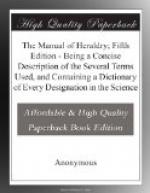[Illustration: Embattled]
Ex. Gules, a bend sinister embattled, argent.
EMBATTLED GRADY. Where the battlements gradually rise one above another.
[Illustration: Embattled Grady]
Ex. Argent, a fess gules, embattled grady. See the lines, p. 11. [CHAP. III.]
EMBOWED. Any thing bent or curved, like a bow.
[Illustration: Embowed]
Ex. Gules, a dolphin naiant embowed or.
EMERALD. The name of a precious stone formerly substituted for vert in emblazoning the arms of the nobility of England.
EN ARRIERE. An expression borrowed from the French, to signify any creature borne with its back to view.
[Illustration: En arriere]
Ex. Argent, an eagle proper en arriere.
ENDORSE. The smallest diminutive of the pale.
[Illustration: Endorse]
Ex. Argent, a pale between endorses gules.
ENGRAILED. Any object being edged with small semi-circles, the points turning outwards, is said to be engrailed.
[Illustration: Engrailed]
Ex. Argent, a pale azure engrailed.
ENHANCED. A term applied to bearings placed above their usual situation.
[Illustration: Enhanced]
Ex. Argent, three bendlets, enhanced gules.
ENSIGNED. This word, in heraldic description, means ornamented.
[Illustration: Ensigned]
Ex. Argent, a man’s heart gules, ensigned with a celestial crown or.
ERASED. Signifies any thing torn or plucked off from the part to which nature affixed it; generally applied to the head and limbs of man or beast.
[Illustration: Erased]
Ex. Argent, a leg erased at the midst of the thigh gules.
ERECT. This is said of any animal or parts of animals, naturally horizontal, being placed in a perpendicular direction.
[Illustration: Erect]
Ex. Argent, a boar’s head erect, and erased.
ERMINE. A white fur with black spots, represented as in the annexed example.
[Illustration: Ermine]
ERMINES. This fur is represented by white spots on a black field.
[Illustration: Ermines]
ERMINOIS. A fur, the field, or, the spots or tufts, sable, as in the annexed example.
[Illustration: Erminois]
ESCALOP. The shell of a sea-fish, used to decorate the palmers on their way to and from Palestine; frequently used as a charge in Heraldry.
[Illustration]
ESCUTCHEON. This word is sometimes used to express the whole coat of arms, sometimes only the field upon which the arms are painted. It more generally denotes the painted shields used at funerals. The field, if the husband is dead and wife survives, is black on the dexter side only; if the wife is deceased, it is black on the sinister side; if both, it is black all over. The example shows that this is the escutcheon of a deceased baron, whose lady survives.




